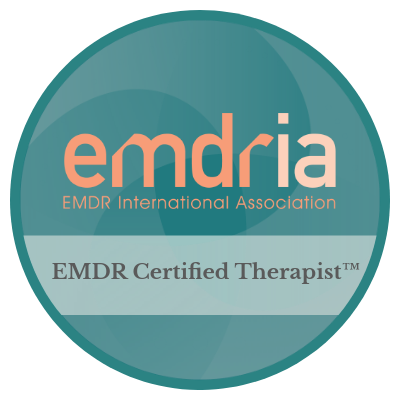EMDR Therapy in Chapel Hill and Online Across NC and SC
Discover the path to regain freedom.
Get past your past
It feels like “a lot” of time has passed, but you can’t let go of what happened
You’ve tried traditional talk therapy, but didn’t see the change you were hoping for
On the outside you appear “fine” but internally you’re struggling
You feel like you’re not living the life you’ve imagined
You feel stuck
What is Eye Movement Desensitization and Reprocessing?
EMDR is an evidence-based approach where we work to explore negative beliefs and help you regain control over your life. We use tapping or eye movements to stimulate both sides of your brain to help you resolve or understand something differently.
It’s a versatile therapy that can be used to address more than just trauma but also:
Anxiety
Depression
Panic attacks
Phobias
Addictions
Grief
Sleep difficulties
Low self-esteem
By reprocessing negative experiences and emotions, EMDR can help you get back to living in the present moment, improve relationships, and feel more confident and in control.
Your brain is like your digestive system.
It is meant to take things in, keep what is important, and release what is not needed. If you joined a hotdog eating contest and ate 50 hotdogs, your digestive system would get pretty overwhelmed. You would probably start to experience negative symptoms like bloating, cramping, and reflux.
Our brains are the same way - when too much hits us at once we start to struggle with overload and that’s when anxiety, depression, low self-worth, trouble sleeping, and irritability arise. EMDR helps the brain release the “stuck” so you can move on from the past.
During an EMDR session, I will guide you through your experiences in a safe and controlled way. I will also lead you through tapping or back-and-forth eye movements, which we call bilateral stimulation. Bilateral stimulation helps the brain process memories and beliefs and helps you find relief.
This technique aids the brain in processing memories and beliefs, ultimately providing you with the relief you seek.
How EMDR Works
EMDR is a complex practice that can sometimes be confusing to folks, so if you have questions, you’re not alone. There are eight phases of EMDR which focus on healing past, present, and future triggers.
The Eight Phases of EMDR
-
We discuss your history, potential targets (the things that upset you), and which order to work on them.
-
You will learn EMDR techniques that will assist you when navigating difficult emotions. I want you to feel confident and prepared for EMDR work!
-
We identify pieces of the targets such as emotions, negative beliefs, and somatic (body) sensations related to the memory.
-
I introduce the bilateral stimulation (eye movements, tapping, buzzers, etc.) to resolve a charged memory, belief, or trigger. An example is that you move from “it was my fault” to “it was not my fault.”
-
We install the positive belief by using bilateral stimulation and replace the negative belief. An example is “wow, I really did the best I could at the time.”
-
We assess for any remaining somatic symptoms in the body and process them out. Any tightness in your chest or knots in your stomach? We work to move them out of the body.
-
We spend time to return to a state of relaxation and review coping skills and self-care plan. I want to make sure you’re feeling grounded and present before leaving the session.
-
We recheck ratings and your experience and identify new targets or needs.
EMDR can help you…
Leave behind uninspiring therapy that hasn't yielded results
Experience relief from feeling stuck and drained due to unchanging situations
Release the past and its hold over you
Regain a sense of who you are and what you want life to be
Find a fresh perspective and renewed hope for the future
You don’t have to keep doing this alone.
FAQs
-
Click this link to schedule your initial consultation with me and I’ll reach out within 2 business days!
-
Trauma arises when we find ourselves 'stuck' following a distressing experience. It can harm our sense of safety, our identity, and our ability to manage emotions and navigate relationships.
Trauma isn't solely confined to those who have endured war, physical abuse, or violence. It can also stem from growing up with emotionally distant parents, relationship challenges, betrayal, divorce, major life changes, bullying, loss, accidents, medical uncertainties, and more.
Visit my blog to learn about the difference of Little T and Big T or Contact me to learn more.
-
Yes, everyone dissociates! Have you ever been driving down the road and suddenly found yourself at home without remembering how you got there? That is dissociation. Those living with complex trauma often have learned to dissociate as an adaptive and protective response.
I have education and training in screening for and working with dissociation, and adapting EMDR techniques for those on the dissociative spectrum. I actively seek consultation for furthering my ability to work with dissociation, as I continue growing as a clinician in this specialty.
In my practice, I work collaboratively with clients to determine their best therapeutic path, and how to improve their day-to-day life while fostering a supportive and empowering therapeutic journey.
-
No, you don’t! I am trained and have experience in other in other approaches to help clients work through trauma. Contact me to learn more.
-
Absolutely, I have specialized training to assist children in processing upsetting events, coping with the loss of family members or pets, and addressing anxiety or phobias.
-
As much as I WISH I had a crystal ball and could predict healing for my clients, the time it takes varies for each person. While EMDR can shorten length of time in therapy, it is not a magic fix and does require consistency and commitment to achieve best results. However, many people report experiencing relief from symptoms within the first month of treatment. Contact me to learn more.
-
Standard sessions are 50 minutes but our reprocessing sessions can be booked for a longer time if desired. We can discuss together if you would benefit from having an extended session. Contact me to learn more.
How can I learn more about EMDR?
Please visit www.emdria.org to learn more about EMDR. I also invite you to watch the video linked below.




